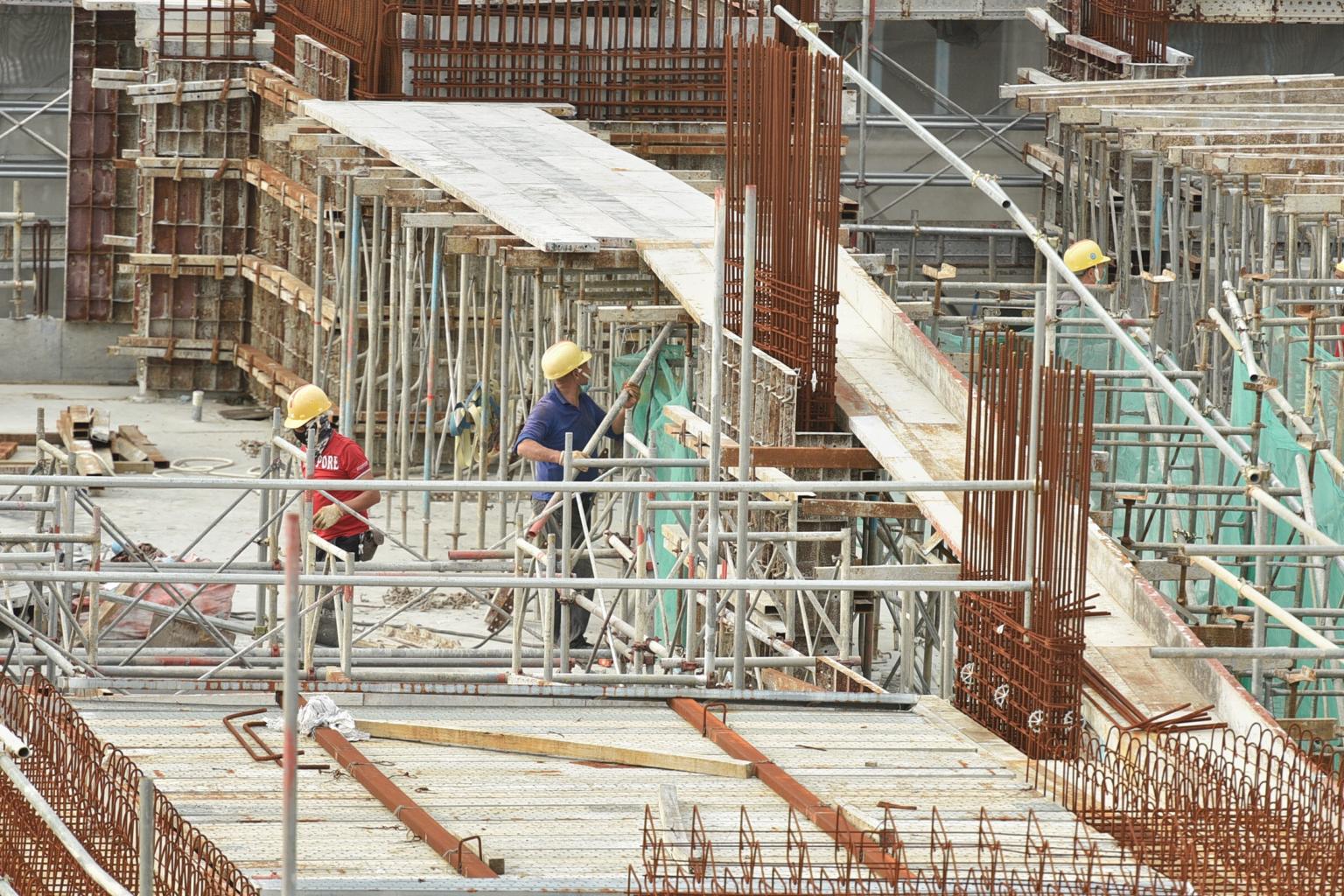Longer waiting time for homes, increased costs due to tighter Covid-19 curbs on migrant workers: Contractors Association
Sign up now: Get ST's newsletters delivered to your inbox

Scal said the construction sector has been facing a serious labour crunch since 2020, after many migrants workers returned home amid the pandemic.
ST PHOTO: DESMOND WEE
SINGAPORE - Home buyers in Singapore will face a longer wait time for their property and higher costs as a result of the border restrictions on travellers from India, the Singapore Contractors Association Limited (Scal) said on Friday (April 23).
It added that the construction sector is already facing delays which have seen projects knocked back by between nine and 12 months due to a labour crunch brought about by the Covid-19 pandemic.
On Thursday, the Government announced that long-term pass holders and short-term visitors with recent travel history to India will not be allowed entry or transit through Singapore, with the new rule taking effect from Saturday (April 24).
It will also affect those who have previously obtained approval from the authorities to enter the country.
Education Minister Lawrence Wong, who is co-leading the multi-ministry task force tackling Covid-19, said it will have a major impact on the construction sector.
On Friday, Scal sounded warnings for a longer wait time for the completion of Housing Board Build-To-Order (BTO) flats and private apartments.
It said other buildings such as healthcare facilities and infrastructure projects will also be delayed.
"The repercussions are that Singaporeans will inevitably be paying for higher construction costs if the situation is not resolved soon," said Scal in a statement.
It noted that the cost of labour and materials has escalated by 30 per cent to 50 per cent.
"This tightening will adversely affect the inflow of construction workers and will negatively impact the timeline of construction projects and cause further delays," said the construction association.
The construction sector has been facing a serious labour crunch since last year, after many migrants workers returned home amid the pandemic.
"Some companies may be forced to close and it will adversely impact some 100,000 residents working in the construction sector," said Scal.
The border restrictions were announced amid a spike in new Covid-19 cases in India. It reported 332,730 new cases on Friday, the world's biggest single-day surge for the second consecutive day.
A new "double-mutant" variant, which emerged there, is thought to be fuelling the country's second wave.
Scal said it is concerned that some people have tried to link the issue of foreign workers from India with the Singapore-India Comprehensive Economic Cooperation Agreement, a free trade pact between the two countries, and stressed that it has no links.
"The construction industry needs migrant workers as they form the backbone of the labour force, and the majority of these workers are from India and Bangladesh. We need to bring workers in as no Singaporeans are willing to work as construction workers," said Scal.
It added that it is currently working to source for manpower from other countries in the Asean region and to bring them to Singapore, with lower stay-home notice costs and inclusion in the vaccination programme.
As at last December, there were 288,700 foreigners working in the construction sector, according to data from Ministry of Manpower.
Last year, the foreign construction workforce shrank by 52,800 people.
Companies in all three affected sectors told The Straits Times that their biggest challenge is bringing in new workers from India - their largest manpower source - to replenish their already diminished workforce.
Straits Construction's executive director Kenneth Loo said his company had been planning to bring in more than 100 workers from India in the next few months.
"We had already lost some 100 to 200 workers since the start of Covid-19 and was hoping to increase manpower, but now it seems we'll just have to work with the resources we have on hand," he said.
A spokesman for Leads Specialist Services, which does welding inspection, said the company was expecting almost 20 workers from India to come in this month to increase their operations by 20 per cent, but has now "lost all hope".
BSM Engineering Works and Trading, which repairs ship parts, was expecting three workers from India by this month, which would allow it to increase productivity.
Mr Ng Wei Guang, manager at NYF Marine, which provides blasting and painting services for oil tanks, was expecting six workers in early May.
"I was hoping to put more manpower into our current projects to boost the efficiency so that I can move on to other projects," he said.
Some companies, now caught in a bind, are holding out for Government intervention.
Wee Hur Construction's director for tender and contracts Sua Chen Shiua said: "We're hoping the Government can grant us more time to complete our projects so it can relieve some pressure on us and also enforce that all stakeholders share the (increased) expenses instead of contractors taking the biggest hit."


